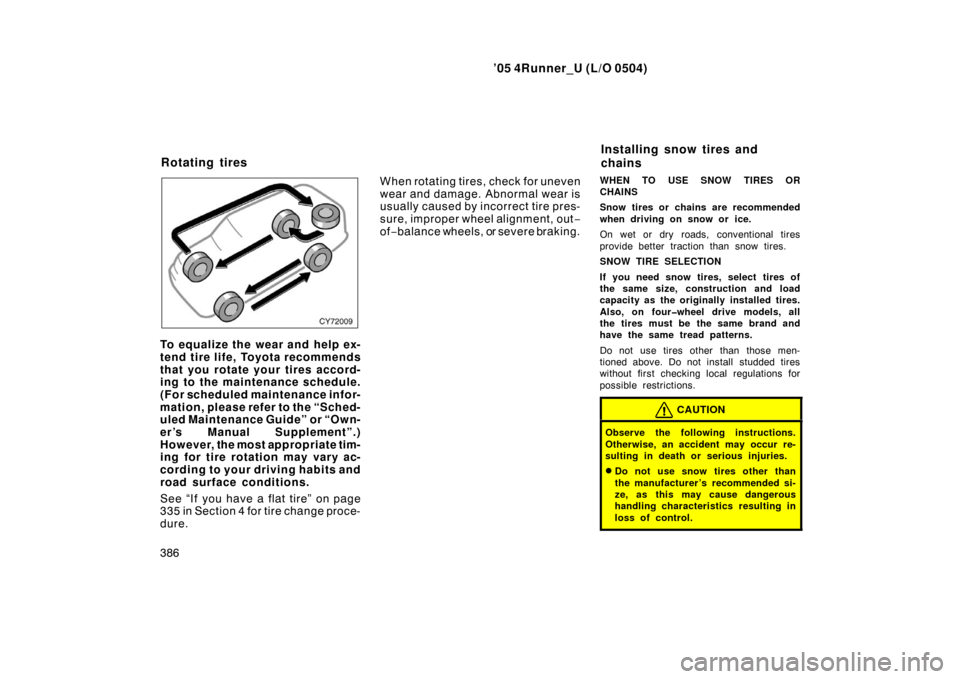Page 375 of 426

’05 4Runner_U (L/O 0504)
365
Doors and engine hood
Check that all doors including back door
operate smoothly and all latches lock se-
curely. Make sure the engine hood sec-
ondary latch secures the hood from open-
ing when the primary latch is released.
Tire inflation pressure
Check the pressure with a gauge ev-
ery two weeks, or at least once a
month. See page 381 in Section 7 −2
for additional information.
Tire surface and wheel nuts
Check the tires carefully for cuts,
damage or excessive wear. See page
384 in Section 7− 2 for additional in-
formation. When checking the tires,
make sure no nuts are missing, and
check the nuts for looseness. Tighten
them if necessary.
Tire rotation
Rotate the tires according to the
maintenance schedule. (For sched-
uled maintenance information, please
refer to the “Scheduled Maintenance
Guide” or “Owner ’s Manual Supple-
ment”.) See page 386 in Section 7 −2
for additional information.
Be on the alert for changes in perfor-
mance, sounds, and visual tip −offs that
indicate service is needed. Some impor-
tant clues are as follows:
�Engine missing, stumbling, or pinging
�Appreciable loss of power
�Strange engine noises
�A leak under the vehicle (however, wa-
ter dripping from the air conditioning
after use is normal.)
�Change in exhaust sound (This may
indicate a dangerous carbon monoxide
leak. Drive with the windows open and
have the exhaust system checked im-
mediately.)
�Flat −looking tire; excessive tire squeal
when cornering; uneven tire wear
�Vehicle pulls to one side when driving
straight on a level road
�Strange noises related to suspension
movement
�Loss of brake effectiveness; spongy
feeling brake pedal; pedal almost
touches floor; vehicle pulls to one side
when braking
�Engine coolant temperature continually
higher than normal If you notice any of these clues, take your
vehicle to your Toyota dealer as soon as
possible. It probably needs adjustment or
repair.
CAUTION
Do not continue driving with the ve-
hicle unchecked. It could result in se-
rious vehicle damage and possibly
personal injury.
Does your vehicle need
repairing?
Page 396 of 426

’05 4Runner_U (L/O 0504)
386
To equalize the wear and help ex-
tend tire life, Toyota recommends
that you rotate your tires accord-
ing to the maintenance schedule.
(For scheduled maintenance infor-
mation, please refer to the “Sched-
uled Maintenance Guide” or “Own-
er’s Manual Supplement”.)
However, the most appropriate tim-
ing for tire rotation may vary ac-
cording to your driving habits and
road surface conditions.
See “If you have a flat tire” on page
335 in Section 4 for tire change proce-
dure. When rotating tires, check for uneven
wear and damage. Abnormal wear is
usually caused by incorrect tire pres-
sure, improper wheel alignment, out
−
of −balance wheels, or severe braking.
WHEN TO USE SNOW TIRES OR
CHAINS
Snow tires or chains are recommended
when driving on snow or ice.
On wet or dry roads, conventional tires
provide better traction than snow tires.
SNOW TIRE SELECTION
If you need snow tires, select tires of
the same size, construction and load
capacity as the originally installed tires.
Also, on four�wheel drive models, all
the tires must be the same brand and
have the same tread patterns.
Do not use tires other than those men-
tioned above. Do not install studded tires
without first checking local regulations for
possible restrictions.
CAUTION
Observe the following instructions.
Otherwise, an accident may occur re-
sulting in death or serious injuries.
�Do not use snow tires other than
the manufacturer ’s recommended si-
ze, as this may cause dangerous
handling characteristics resulting in
loss of control.
Rotating tires Installing snow tires and
chains
Page 414 of 426

’05 4Runner_U (L/O 0504)
404
“Toyota Genuine Motor Oil” is used in
your Toyota vehicle. Use Toyota approved
“Toyota Genuine Motor Oil” or equivalent
to satisfy the following grade and
viscosity.
Oil grade:
API grade SL “Energy −Conserving” or
ILSAC multigrade engine oil
Recommended oil viscosity: SAE 5W −30
Outside temperature
Please contact your Toyota dealer for fur-
ther details. COOLING SYSTEM
Total capacity, L (qt., Imp. qt.):
1GR −FE engine 9.8 (10.4, 8.6)
2UZ− FE engine 12.3 (13,0, 10.8)
Coolant type:
“Toyota Super Long Life Coolant” is
used in your Toyota vehicle at factory
fill. In order to avoid technical problems,
only use “Toyota Super Long Life
Coolant” or similar high quality ethylene
glycol based non −silicate, non −amine,
non− nitrite, and non− borate coolant with
long− life hybrid organic acid technology.
(Coolant with long −life hybrid organic
acid technology is a combination of low
phosphates and organic acids.)
Do not use plain water alone.
Please contact your Toyota dealer for
further details.
BATTERY
Open voltage
∗ at 20 �C (68 �F):
12.6—12.8 V Fully charged
12.2—12.4 V Half charged
11.8—12.0 V Discharged
∗: Voltage that is checked 20 minutes af- ter the key is removed with all the
lights turned off
Charging rates: 5 A max. AUTOMATIC TRANSMISSION
Fluid capacity (drain and refill),
L (qt., Imp. qt.):
Up to 3.0 (3.2, 2.6)
Fluid type: Toyota Genuine ATF WS
Change automatic transmission fluid only
as necessary.
Generally, it is necessary to change
automatic transmission fluid only if your
vehicle is driven under one of the Special
Operating Conditions listed in your
“Scheduled Maintenance Guide” or
“Owner ’s Manual Supplement”. When
changing the automatic transmission fluid,
use only “Toyota Genuine ATF WS” (ATF
JWS3324 or NWS9638) to aid in assuring
optimum transmission performance.
Notice: Using automatic transmission
fluid other than “Toyota Genuine ATF
WS” may cause deterioration in shift
quality, locking up of your transmission
accompanied by vibration, and ultimate-
ly damage the automatic transmission
of your vehicle.
Please contact your Toyota dealer for fur-
ther details.